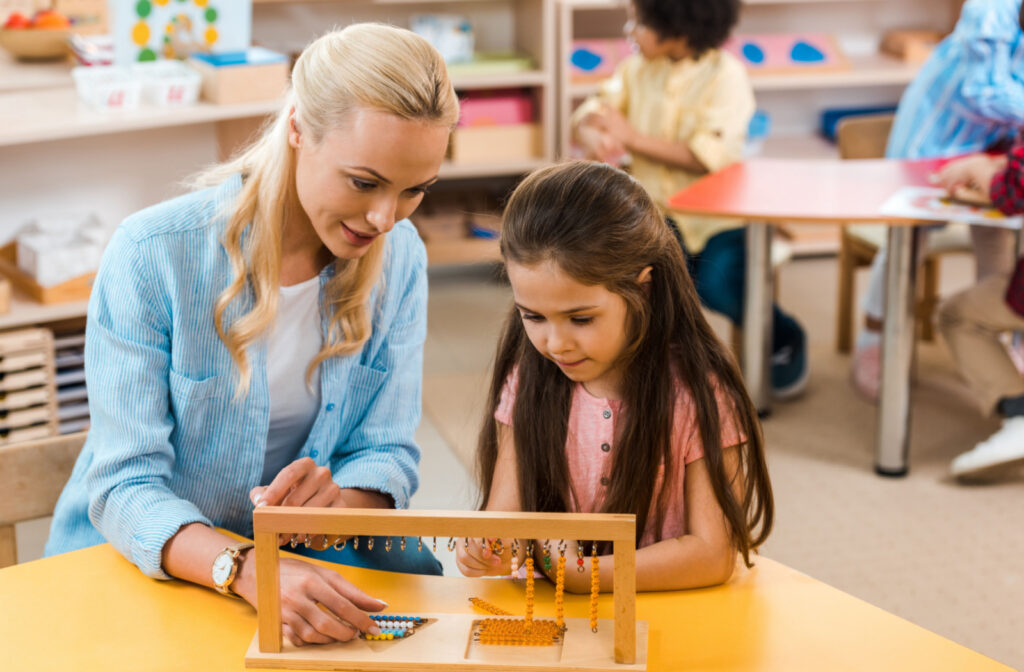A Montessori preschool program follows the methods of Maria Montessori, Italy’s first female doctor. With a background in mathematics, physics, science, anthropology, philosophy, and psychology, she created what is now known as the Montessori method.
The Montessori Method takes advantage of the learning stage of children ages 0–6, at which point students tend to be able to retain the most information. This helps set them up to succeed academically, socially, and emotionally. It can also facilitate a lifelong love of learning, independence, and leadership.
If you want to enter your child into a Montessori preschool program, we encourage you to learn more about our preschool program.
What Is the Montessori Preschool Approach?
The Montessori education method fosters self-directed activity, hands-on learning, and collaborative play.
In these classrooms, children are granted the autonomy to make innovative choices in their learning. At the same time, the teacher, who has undergone extensive training, offers age-appropriate activities that guide the learning process.
This approach creates a dynamic learning environment that encourages exploration, experimentation, and discovery, ultimately leading to a more comprehensive understanding of the subject matter.
What Is the Difference Between a Montessori Preschool & a Typical Preschool?
Children often follow a set curriculum and pace at a typical preschool, but the focus is on personalized learning at Montessori preschools. The structure has less rigidity, allowing children to learn at their own pace and in their own style.
The entire classroom is interactive at a Montessori preschool, and the teachers foster playing with the environment. The teachers will allow them to explore freely, interact with their peers, and ask questions if they are interested in something specific.
The one-on-one nature of Montessori education allows the teacher to guide the child through the years intentionally. They are learning weaknesses and working to strengthen areas where a child may struggle.
At a typical preschool, students that struggle often don’t get the one-on-one teaching they need to succeed. This is why Montessori preschools are becoming more popular around the globe.
What Makes a Montessori Preschool Unique?
When it comes to educating young children, Montessori schools have a unique approach that sets them apart from conventional schools, preschools, and daycare programs.
Instead of grouping children based solely on their age, Montessori classrooms are designed to include students of different ages and skill levels. This multi-age-level approach allows for more personalized and flexible learning experiences catering to each child’s needs.
Additionally, Montessori students typically stay with the same teacher for 3 years. This extended time frame creates strong and meaningful relationships between the teacher and child, and between the teacher and parents.
It also allows for a more in-depth understanding of the child’s unique learning style, strengths, and challenges. Therefore, the teacher can focus on establishing a well-rounded education and improving a child’s knowledge of hard-to-understand topics.
Furthermore, the multi-age-level approach encourages collaboration and socialization among students of different ages.
Younger students learn from their older peers, while older students reinforce their knowledge by teaching younger students. This creates a supportive and inclusive learning environment where kids can thrive.
Montessori schools offer a holistic approach to education that prioritizes personalized learning, strong relationships, and collaboration. Children can develop a deep love for knowledge and a strong sense of community that will serve them well throughout their lives.
The 5 Principles of Montessori
The Montessori method is based on 5 principles. These 5 principles include:
1. Respect for the Child: Respect is shown for children by not interrupting their concentration and allowing them to make choices, do things, and learn for themselves.
2. The Absorbent Mind: Children use all their senses, which is vital to stimulate their minds in every way possible.
3. Sensitive Periods: This is when a child is hyper-focused on learning a particular skill. Each child will have different lengths of sensitive periods. During these periods, teachers provide resources to help children flourish.
4. The Prepared Environment: Teachers should prepare the learning environment by making materials and experiences available to children in an orderly and independent way. The Montessori method suggests that children learn best when meant to do things themselves.
5. Auto Education: Montessori teachers provide the environment, inspiration, guidance, and encouragement for children to educate themselves. It is a primary belief that children can educate themselves with the right system in place.
The Montessori Classroom
Montessori believed that the learning environment (including teachers, experiences, and the physical environment) might positively or negatively impact children’s education. Therefore, Montessori classrooms are set up in such a way as to facilitate and encourage learning.
These include:
- Removing objects that may over-stimulate and distract
- Neutral shades of paint on the wall
- Minimal objects
- Use of natural and real-life materials
- Space for children to move around without disturbing others
- Storage for children to store personal items and project work
- A quiet, calm, and uncluttered classroom
- Carefully chosen artwork that is displayed at children’s eye level
- Sensory resources that appeal to all 5 senses
- The classroom is separated into different learning areas
- Everything has its place
What Curriculum Does Montessori Use?
The Montessori curriculum is designed to provide children with a comprehensive education across 5 key learning areas.
These areas include:
- Practical Life
- Sensorial
- Mathematics
- Language
- Culture
Each study area comprises a range of Montessori materials carefully designed to teach children specific skills and knowledge. By focusing on these essential learning areas, the Montessori approach promotes a well-rounded education that helps prepare children for success in all areas of life.
A Future with Potential
A Montessori education can open up avenues for your child. With a one-on-one approach, flexible curriculum, appropriate socialization, and positive reinforcement, your child will be able to grow at their own pace and according to their own desires. We find that the students we teach end up succeeding better as they move into the elementary grades. Learn more by booking an appointment to come and tour our Parkdale campus.


